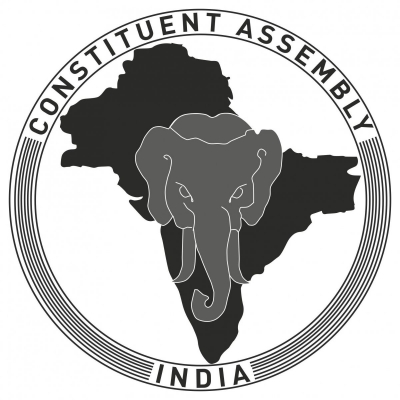Bhimrao Ramji Ambedkar (14 April 1891 6 December 1956) was an Indian jurist, economist, social reformer and political leader who headed the committee drafting the Constitution of India from the Constituent Assembly debates, served as Law and Justice minister in the first cabinet of Jawaharlal Nehru, and inspired the Dalit Buddhist movement after renouncing Hinduism.
Ambedkar graduated from Elphinstone College, University of Bombay, and studied economics at Columbia University and the London School of Economics, receiving doctorates in 1927 and 1923 respectively and was among a handful of Indian students to have done so at either institution in the 1920s. He also trained in the law at Gray's Inn, London. In his early career, he was an economist, professor, and lawyer. His later life was marked by his political activities; he became involved in campaigning and negotiations for India's independence, publishing journals, advocating political rights and social freedom for Dalits, and contributing significantly to the establishment of the state of India. In 1956, he converted to Buddhism, initiating mass conversions of Dalits.In 1990, the Bharat Ratna, India's highest civilian award, was posthumously conferred on Ambedkar. The salutation Jai Bhim (lit. "Hail Bhim") used by followers honours him. He is also referred to by the honorific Babasaheb (BAH-b SAH-hayb).
The Constituent Assembly of India was elected to frame the Constitution of India. It was elected by the 'Provincial Assembly'. Following India's independence from British Government in 1950, its members served as the nation's first Parliament.
An idea for a Constituent Assembly was proposed in 1934 by M. N. Roy, a pioneer of the Communist movement in India and an advocate of radical democracy. It became an official demand of the Indian National Congress in 1935,The Indian National Congress held its session at Lucknow in April 1936 presided by Pt. Jawahar Lal Nehru. The official demand for Constituent Assembly was raised and Government of India Act, 1935 was rejected as it imposed the Constitution which was against the will of the Indians. C. Rajagopalachari voiced the demand for a Constituent Assembly on 15 November 1939 based on adult franchise, and was accepted by the British in August 1940.
On 8 August 1940, a statement was made by Viceroy Lord Linlithgow about the expansion of the Governor-General's Executive Council and the establishment of a War Advisory Council. This offer, known as the August Offer, included giving full weight to minority opinions and allowing Indians to draft their own constitution. Under the Cabinet Mission Plan of 1946, elections were held for the first time for the Constituent Assembly. The Constitution of India was drafted by the Constituent Assembly, and it was implemented under the Cabinet Mission Plan on 16 May 1946. The members of the Constituent Assembly were elected by the provincial assemblies by a single, transferable-vote system of proportional representation. The total membership of the Constituent Assembly was 389 of which 292 were representatives of the provinces, 93 represented the princely states and four were from the chief commissioner provinces of Delhi, Ajmer-Merwara, Coorg and British Baluchistan.
The elections for the 296 seats assigned to the British Indian provinces were completed by August 1946. Congress won 208 seats, and the Muslim League 73. After this election, the Muslim League refused to cooperate with the Congress and the political situation deteriorated. Hindu-Muslim riots began, and the Muslim League demanded a separate constituent assembly for Muslims in India. On 3 June 1947 Lord Mountbatten, the last British Governor-General of India, announced his intention to scrap the Cabinet Mission Plan; this culminated in the Indian Independence Act 1947 and the separate nations of India and Pakistan. The Indian Independence Act was passed on 18 July 1947 and, although it was earlier declared that India would become independent in June 1948, this event led to independence on 15 August 1947. The Constituent Assembly met for the first time on 9 December 1946, reassembling on 14 August 1947 as a sovereign body and successor to the British parliament's authority in India.
As a result of the partition, under the Mountbatten plan, a separate Constituent Assembly of Pakistan was established on 3 June 1947. The representatives of the areas incorporated into Pakistan ceased to be members of the Constituent Assembly of India. New elections were held for the West Punjab and East Bengal (which became part of Pakistan, although East Bengal later seceded to become Bangladesh); the membership of the Constituent Assembly was 299 after the reorganization, and it met on 31 December 1947.
The constitution was drafted by 299 delegates from different caste, region religion, gender etc. These delegates sat over 114 days spread over 3 years (2 years 11 months and 18 days to be precise) and discussed what the constitution should contain and what laws should be included. The Drafting Committee of the Constitution was chaired by [B.R.Ambedkar].

1949Nov, 26
The Constituent Assembly of India adopts the constitution presented by Dr. B. R. Ambedkar.
Choose Another Date
Events on 1949
- 1Apr
Communist Party of China
Chinese Civil War: The Chinese Communist Party holds unsuccessful peace talks with the Nationalist Party in Beijing, after three years of fighting. - 20Jul
1948 Arab-Israeli War
Israel and Syria sign a truce to end their nineteen-month war. - 1Oct
Mao Zedong
The People's Republic of China is established and declared by Mao Zedong. - 2Oct
Mao Zedong
The Soviet Union recognises the People's Republic of China, proclaimed the previous day by Mao Zedong. - 14Oct
People's Liberation Army
Chinese Civil War: Chinese Communist forces occupy Guangzhou.

 English
English  español
español  français
français  português
português  русский
русский  العربية
العربية  简体中文
简体中文 